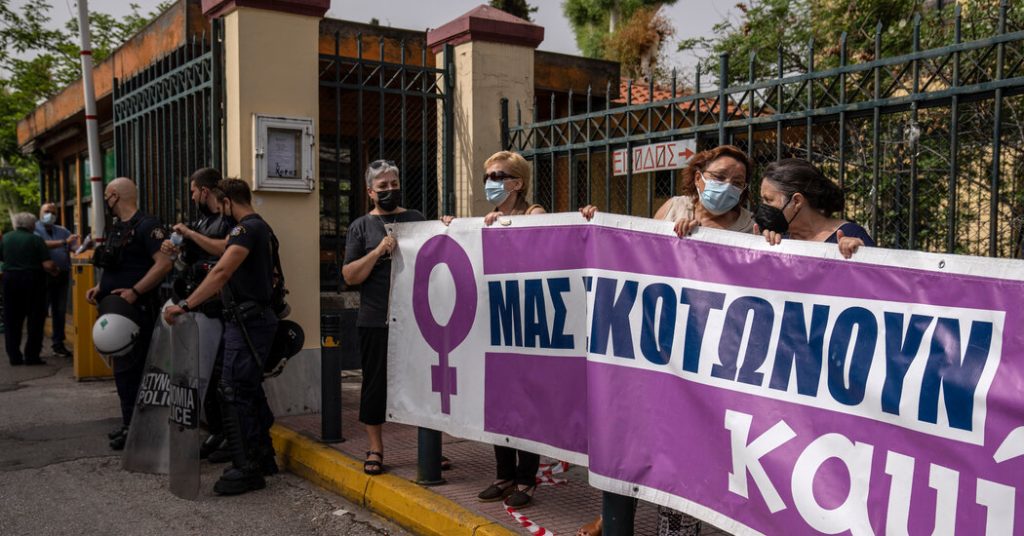Let’s dive into the recent developments in Greece regarding domestic violence legislation, a story that unfolds against a backdrop of both progress and mounting criticism. It’s a narrative not just about laws but also about the messy, human complexities behind them — policies, politics, and the human toll of abuse.
—
Imagine this: it’s a heated day in Greece’s Parliament. Politicians are locked in fierce debates over a bill that promises to crack down on domestic violence. On the surface, it sounds like progress — tougher penalties, victims no longer required to appear in court, and more alignment with a European Union directive aimed at addressing this pervasive issue. But as the voting wraps up, it’s clear that the new law, which passed with 157 votes in Greece’s 300-seat Parliament, has sparked more questions than celebration.
At the heart of this debate lies a fundamental divide: Is stopping domestic violence only about enforcing harsher punishments, or does it take something more nuanced — like prevention, education, and support systems for victims?
—
### A Law That’s Both Progress and a “Missed Opportunity”
On paper, this law deepens protections for victims. For example, it extends pretrial detention for offenders and makes it nearly impossible for sentences to be suspended. To the untrained eye, this might look like a solid win for justice. Ioannis Bougas, Greece’s deputy justice minister, called it a significant step in offering protection to victims.
But critics argue that the law is far from comprehensive. Advocacy groups, lawyers, and even judges say it’s a fragmentary attempt to comply with the EU directive, which is slated to become mandatory for member states by 2024. That directive doesn’t just ask for harsher penalties — it emphasizes prevention, public awareness campaigns, technology-driven solutions, and better resources for vulnerable groups.
Anna Vouyioukas, an advocacy officer at the Diotima Center in Athens, put it bluntly: the bill is a “missed opportunity.” She highlighted how it fails to address key provisions for groups like older people, sexual minorities, migrants, and those financially vulnerable. For these populations, domestic violence often comes layered with even more challenges — like cultural taboos or financial dependence — making specialized support critical.
—
### The Surge in Domestic Violence — What’s Behind the Numbers?
Greece, like many countries, has been struggling with a surge in domestic violence. Official figures tell a stark story: reports of domestic violence nearly doubled between 2021 and 2022, with 22,080 cases documented last year. Arrests climbed in parallel, doubling to 13,503.
But here’s the twist — no one is quite sure if these numbers represent an actual spike in abuse or simply more victims coming forward. Until 2020, Greek police didn’t keep specific statistics on domestic violence, a reflection of how little attention this issue had historically received. Cultural shifts, including the global #MeToo movement, have undoubtedly played a role in encouraging victims to speak out. Particularly in Greece, a watershed moment came in 2021 when Sofia Bekatorou, an Olympic sailing champion, accused a prominent sports official of sexual abuse. Her courage inspired many others to report their own experiences of abuse, both sexual and domestic.
Despite these changing attitudes, experts warn that the data gap makes it hard to isolate causes or even craft fully informed policies. As Vouyioukas aptly summarized, “It’s a complex phenomenon” requiring years of research to unravel.
—
### The Double-Edged Sword of Tougher Punishments
While the intent behind the new law appears noble, experts warn that its execution could backfire in complex ways. For instance, by making prison time an automatic consequence for domestic violence accusations, the law inadvertently discourages some victims from coming forward. Clio Papapadoleon, a lawyer with experience representing abuse victims, explains the dilemma: “You have to think of the psychology of these people. If someone has three kids with her partner, she’ll think twice about reporting him if she knows he’s going to go to prison immediately.”
This concern reflects a broader critique of focusing exclusively on incarceration as a solution. Yes, punishment is one piece of the puzzle. But what happens when punishing perpetrators sidelines other crucial aspects of the problem — like early intervention, family counseling, or ensuring victims have financial independence?
Papapadoleon fears this emphasis on incarceration is not only shortsighted but could yield “disastrous” consequences in the long run. There’s a human ripple effect to consider: how do these policies impact the families involved, especially children caught in the middle?
—
### Judicial Pushback and Constitutional Concerns
It’s not just advocacy groups raising red flags. Greece’s judiciary has been vocal in its resistance, with the Greek union of judges and prosecutors outright labeling the new law “dangerous.” One controversial provision allows defendants to be convicted without being able to question plaintiffs directly, a move criticized as undermining basic legal rights like the presumption of innocence and ensuring a fair trial.
Lawyers are also up in arms, staging walkouts to protest against measures like extended pretrial detention. They argue these provisions violate both constitutional protections and broader principles of justice.
Michalis Chrysochoidis, the public order minister, insists that tackling domestic violence is a national priority. To his credit, he’s already spearheaded efforts to expand practical resources, like opening state shelters for victims. Yet, as Papapadoleon points out, much of the government’s action feels reactive rather than proactive. “If it’s after the murder, or it’s after the rape, it’s too late,” she said.
—
### A Call for Holistic Solutions
What then is the solution to Greece’s domestic violence crisis? Critics of the current law are not rejecting its intentions outright but argue for a much broader and more holistic approach. This isn’t just about harsher sentences; it’s about creating a complete safety net for victims and shifting societal attitudes over time.
The EU directive offers a roadmap, emphasizing public awareness campaigns, enhanced digital tools to combat things like cyberstalking, and better data collection. It also calls for stronger collaboration between governments, NGOs, and specialists to form a united front against abuse. For advocacy groups like the Diotima Center, this multifaceted approach is non-negotiable.
What’s evident from the ongoing debates is that the fight against domestic violence is complex, requiring more than just punitive measures. Trust needs to be built between victims and authorities, shelters need to be accessible, and culturally sensitive measures must address the unique barriers faced by different communities.
—
As Greece grapples with this issue, one thing is clear: the journey to meaningful change is far from over. While the new law offers some steps in the right direction, it opens up a broader conversation about justice, prevention, and societal responsibility.
In the end, this isn’t just about ticking legal checkboxes; it’s about saving lives, rebuilding communities, and addressing a problem that touches every corner of society. And for that, laws alone won’t be enough. It takes comprehensive strategies, cultural shifts, and a national commitment to do better, not just after tragedies strike but before they ever happen.










